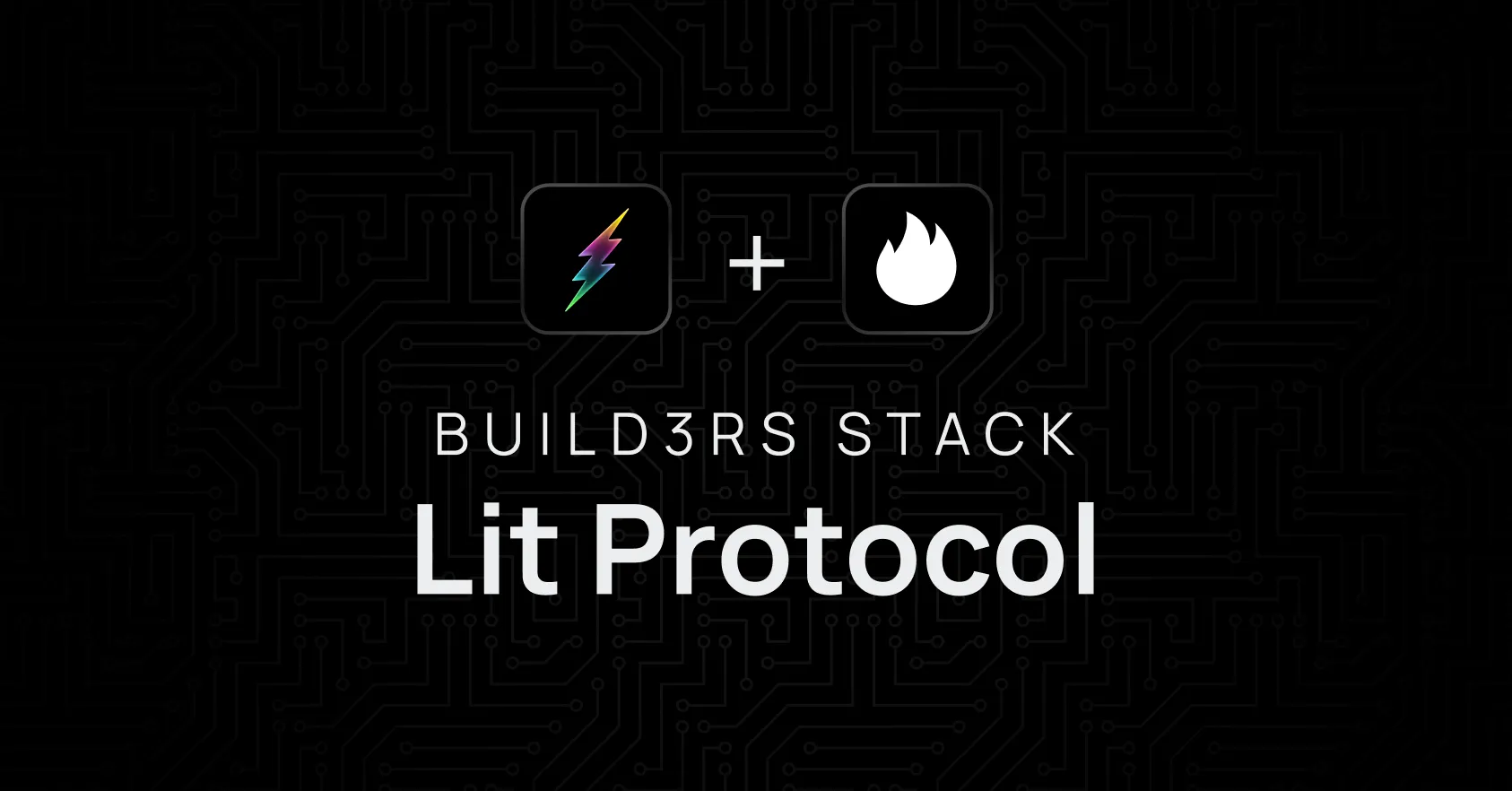Build3rs Stack: Lit Protocol

Welcome to the Build3rs Stack, Fleek’s web3 infrastructure overview series. This week we will take a look at Lit Protocol - A decentralized key management network! We will talk in depth about its main features, resources, and all the necessary information you need to get started.
In a nutshell, Lit Protocol is a distributed key management network with signing, encryption and compute capabilities, allowing you to create and administer decentralized cryptographic key pairs that enable conditional encryption and automated signing based on specific criteria. Let’s dive into it!
TL;DR: What is Lit Protocol?

Lit Protocol is a versatile network designed for managing keys and ensuring secure data transactions. It works with any EVM Chain, Solana and Cosmos. This blockchain-agnostic nature enables seamless data transactions, encryption, and access control across different networks.
At its core, Lit Protocol aims to make public key cryptography, the basis for internet security and crypto, more decentralized. Public key cryptography is used for two main purposes: encrypting information for authorized access only, and signing data to confirm its authenticity or carry out actions. Encryption is the process of hiding data from unauthorized users, while signing is a digital “proof” of a transaction or interaction on a blockchain, like selling crypto or listing an NFT. This is done via:
Lit Actions: These immutable JavaScript functions, hosted on IPFS, govern PKPs. They determine when, why, and what a PKP will sign, functioning like smart contracts with the added capability of using off-chain data in their computations.
Advanced Automation: When PKPs and Lit Actions collaborate, they enable sophisticated signing automation for a range of use-cases, such as executing trades based on specific conditions or utilizing off-chain or cross-chain data as triggers for decentralized applications.
Proof Generation: Lit Protocol supports conditional-based signing through Lit Actions, allowing users to verify data from multiple sources, including off-chain APIs or cross-chain applications. This feature creates proofs based on predetermined conditions, further extending the protocol’s functionality.
Lit Protocol in Features: Access Control & Programmatic Signing.
At its core, Lit Protocol enables the following features:
Decentralized Access Control: Lit Protocol enables users to set their own encryption and access control rules without depending on a central authority. This not only enables privacy features, but also monetization or gated experiences depending on different conditions (such as holding a particular token).
Programmatic Signing with Programmable Key Pairs (PKPs) and Lit Actions: PKPs are cryptographic key pairs generated by network validators and stored as distributed shares across the Lit network. They are represented by minted NFTs, and only authorized users can sign with the PKP. Lit Actions are immutable JavaScript functions that govern PKPs, specifying when, why, and what a PKP will sign. For example, with this you can easily have multi-signature transactions on behalf of a user to achieve things like automatic trades based on price-changes.
How you can use Lit Protocol as a Builder: Applied Use-Cases.
Let’s take a look at the use cases of Lit Protocol to understand more about how these features can add value to your builds!
dApps with Private Data (e.g. Orbis)
Orbis Club uses Lit Protocol to allows users to create exclusive content and share encrypted messages accessible only by a select group of friends. By leveraging Lit Protocol’s decentralized access control, Orbis Club can establish specific on-chain conditions that must be met for users to access the content or messages. This ensures a secure and private environment for users to interact, share, and communicate with their trusted friends.
DeFi Automation (e.g. Sling Protocol)
Sling Protocol is another use case of Lit Protocol that focuses on DeFi automation by utilizing PKPs (Programmable Key Pairs) and Lit Actions - the goal is to simplify and automate interactions across various decentralized finance platforms, by facilitating liquid staking, allowing users to stake their tokens in DeFi protocols while maintaining liquidity.
Getting Started with Lit Protocol
Lit has several tools that will help you get set developing with it! But first,let’s start with the official documentation, and then move on to other resources:
- SDK Javascript - Starter Kit
- Programmable Key Pairs - Quick start
- Access Control - Introduction to Decentralized Access Control
- GetLit CLI - Getting started with the CLI for Lit Actions.
- Supported Blockchains - all the supported blockchains in Lit.
- Projects Building with Lit - ecosystem.
We hope that this guide has given you the necessary information and tools to start building with Lit Prtotocol! Make sure to follow Lit Protocol for further updates and developments.
Additionally, we encourage you to check out our previous Build3rs Stack series and keep an eye out for upcoming ones so that you can stay informed about the latest updates about web3 infrastructure. You can also join our Discord community to connect with us quickly.
For more resources visit our LinkTree.